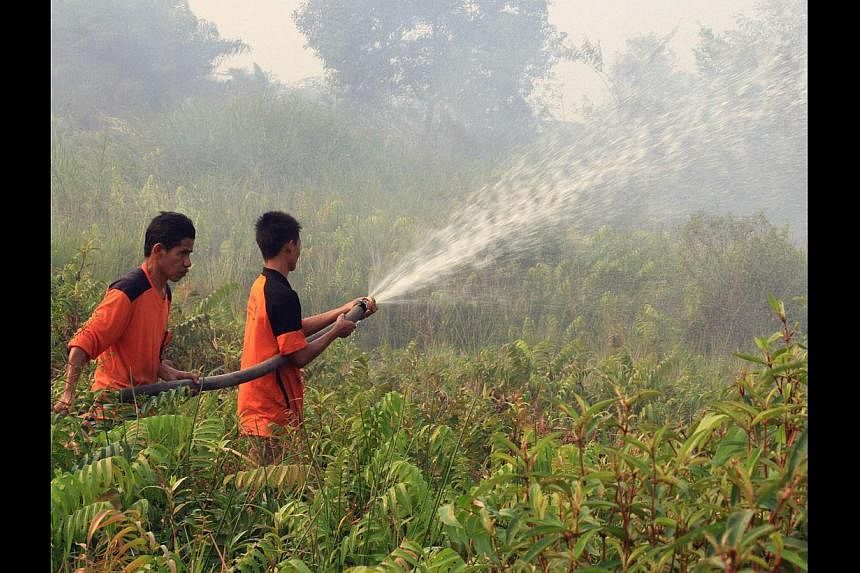At a time when forest areas in Sumatra and Kalimantan were causing haze in the region, Indonesia's lawmakers finally decided to ratify the Asean Agreement on Transboundary Haze Pollution on Sept 16.
The move essentially removed what had long been a "diplomatic disturbance" for Indonesia's environment and foreign ministries at every regional meeting on forest fires and transboundary haze.
Two months ago, at a presentation to the Indonesian Parliament's Commission VII (which oversees the environment), I told members of the commission that delaying ratification will do more harm than good.
The House of Representatives did not have strong reasons not to ratify the agreement, as it will continue to complicate Indonesia's diplomacy efforts within Asean and internationally. Any further delay is also bad for the environment.
Some of the questions posed to me by several House members at the presentation gave the impression the members had never read the articles under the agreement.
One lawmaker said that, until my presentation, the government had not given them a comprehensive explanation on the pros and cons of ratifying the haze agreement.
Indonesia is the last of the 10 Asean countries to ratify the haze pact, which obliges countries to, among other responsibilities, cooperate to prevent and monitor cross-border haze, set up an early warning system and exchange information and provide mutual help during fires.
Countries are also required to take appropriate measures to monitor fire-prone areas and undertake measures to prevent and control activities related to land clearing and forest fires.
The measures include developing and enforcing laws, educating the community and strengthening fire-fighting capacity in the regions.
The above obligations may appear burdensome, but the fact is that most of them have been met by the Indonesian government. There are environmental and forestry laws and two government regulations in place that not only ban the slash-and-burn method in land clearing, but also require all concession-holders to prevent fires in their concession areas.
A national emergency response infrastructure has also been set up to allow coordination in fire-fighting efforts between and among the environment and forestry ministries, the National Disaster Mitigation Agency and regional governments.
There is also constant monitoring of all hot spots in Indonesian forest areas by the central government.
However, these legal and institutional mechanisms seldom operate the way they should. Preventive efforts and public education remain lacking.
Fire-fighting efforts are carried out only when there are protests from neighbouring countries. Fire-fighting equipment and financial support are still lacking - even though forest fires happen every year and have destroyed millions of hectares of Indonesian forests.
Indonesia has to implement the above measures even if there is no Asean haze agreement.
If the Indonesian government is really serious about protecting Indonesia's forests, rich biodiversity and its people, ratifying the haze pact is a step in the right direction.
Besides the above obligations, there are other responsibilities that have to be jointly met with other Asean countries.
Asean countries should make financial arrangements to fund the operations of the Asean Coordinating Centre for Transboundary Haze Pollution Control to prevent and mitigate forest and peatland fires.
Malaysia and Singapore, for instance, could make substantial financial contributions because many of their companies operate in Indonesian forest areas. Intensive diplomatic efforts are needed because, under the haze pact, financial contributions are voluntary. Countries are not obliged to make substantial contributions.
Now that Indonesia has ratified the haze pact, any dispute with fellow Asean countries over haze originating from Indonesia will have to be "settled amicably by consultation or negotiation", as stipulated in Article 27 of the agreement.
In the past, Indonesia's status at regional meetings on forest fires and transboundary haze has always been that of an observer. This meant the Indonesian delegation had no right to vote on the issue or to suggest an amendment or protocol to any agreement being discussed at the table.
It is in Indonesia's interests to become a "party" to the haze pact, which boosts its bargaining position to pursue Indonesia's interests in the region and internationally.
Now that the haze agreement has been ratified, the Indonesian government has to ensure that all obligations under the agreement are properly implemented.
No new laws are required as the current Indonesian laws are sufficient to implement the above obligations and responsibilities.
Indonesia needs to boost its efforts in curbing forest fires as it has now committed itself to the agreement.
Indonesia has to show neighbouring countries and its own people that the government is serious in enforcing the law and, if need be, will take the cukong (big business owners) responsible for the fires to court.
Finally, I place my hopes in president-elect Joko Widodo and his deputy Jusuf Kalla, and hope they will extend the moratorium on the issuance of new licences for logging and other land uses in primary natural forests and peatlands. The nationwide moratorium issued by President Susilo Bambang Yudhoyono expires next year.
The writer is a senior adviser on legal affairs at the Partnership for Governance Reform (Kemitraan) and an international environmental law lecturer at Hasanuddin University in Makassar.

